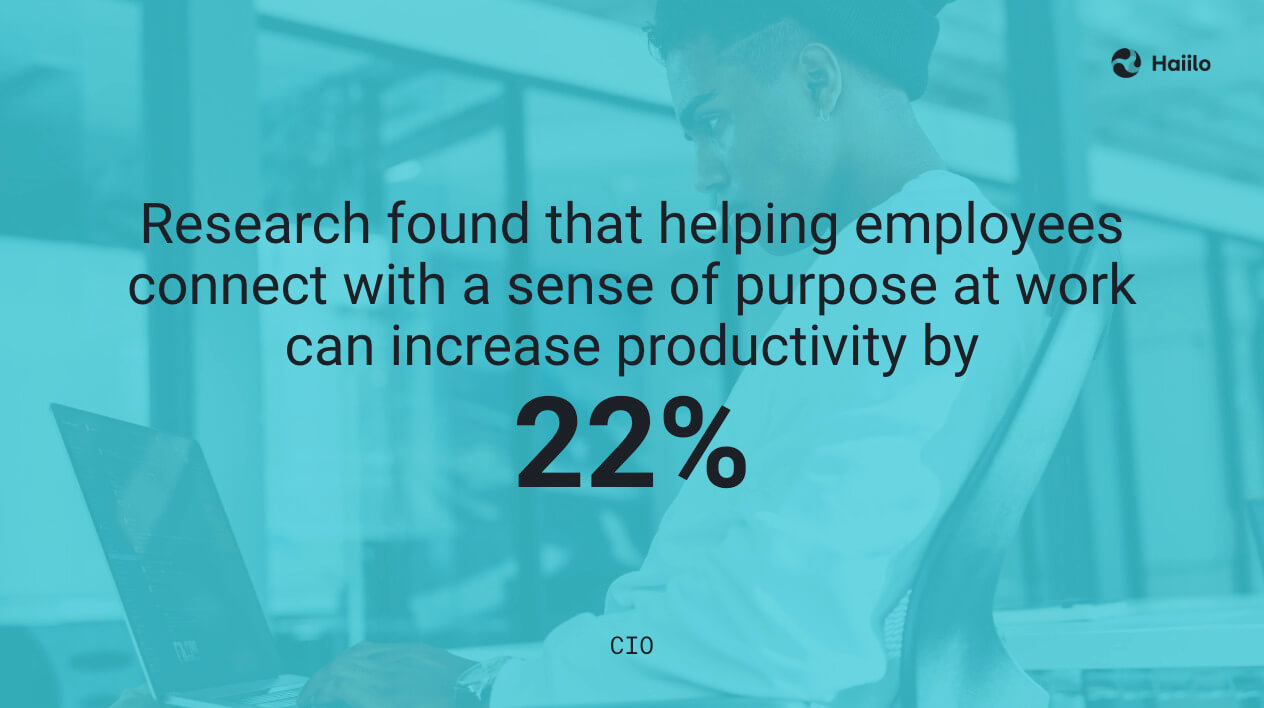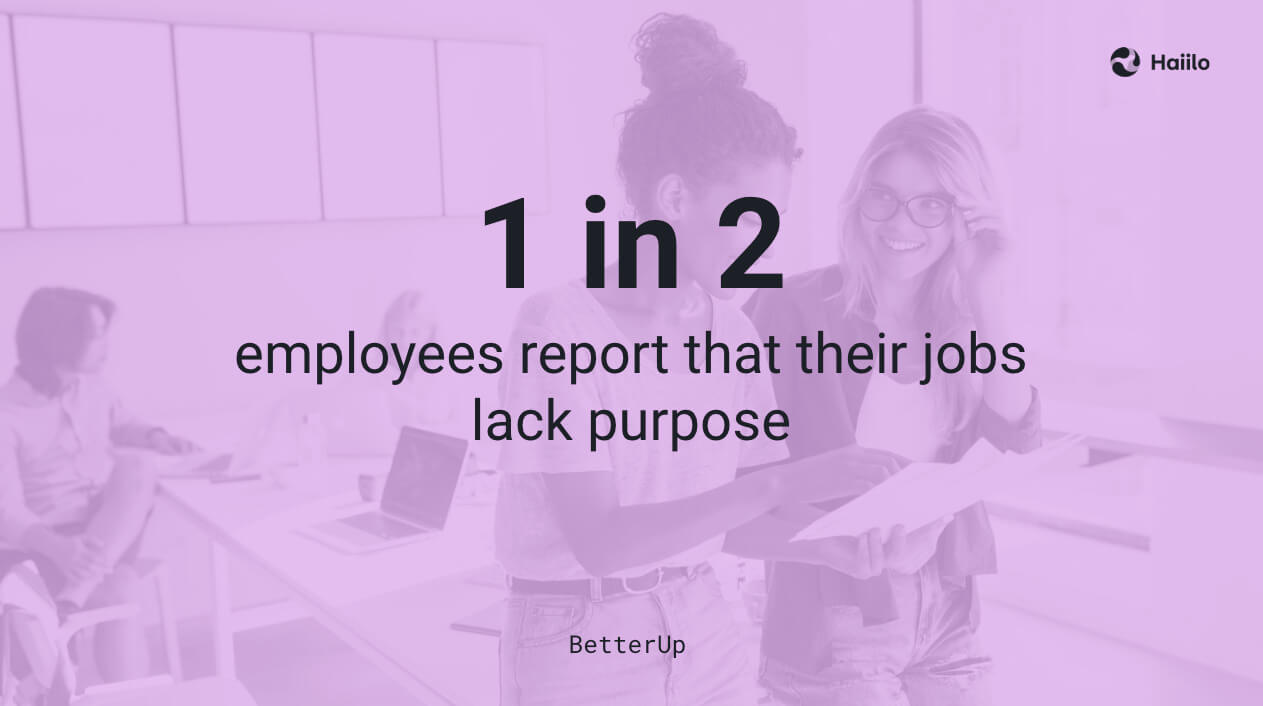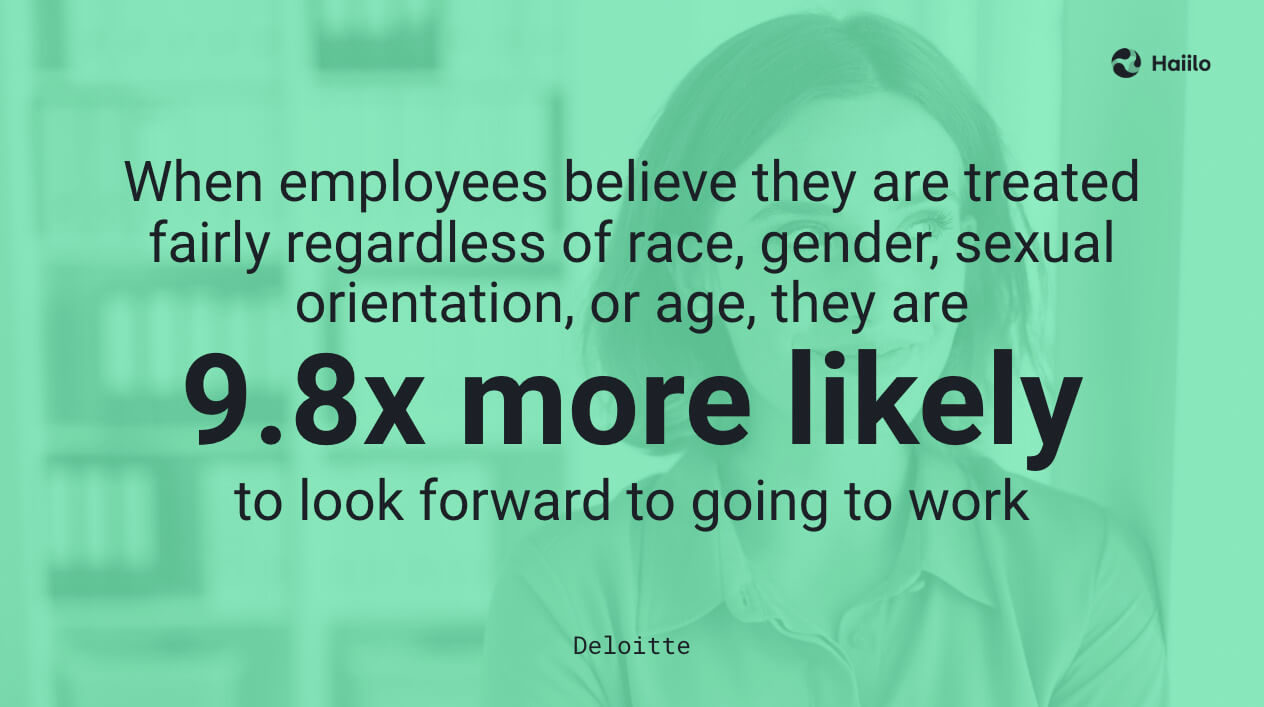Finding meaning and purpose at work is the most important driver of employee motivation and engagement in the workplace.
When employees don’t find their jobs purposeful, their morale drops, and they are not motivated to achieve great results. Consequently, these people tend to leave their organizations in search of new opportunities and jobs that make them more fulfilled.
Research by CIO found that creating more meaning for employees in their work boosts:
- Motivation by 55%
- Loyalty by 42%
- Pride by 32%
Furthermore, the study found that helping employees connect with a sense of purpose at work can increase productivity by 22%.

While some people are great at self-motivation, in the long run, employers are responsible for maintaining their level of engagement and creating a positive workplace experience and a motivating environment for all.
- 1. Understand your workforce
- 2. Build a strong company culture
- 3. Drive organizational alignment
- 4. Help your workplace stay connected
- 5. Make employees feel empowered
- 6. Show empathy
- 7. Give frequent feedback and recognition
- 8. Enable people to grow
- 9. Make Diversity and Inclusion Your Top Priority
1. Understand your workforce
According to McKinsey, 70% of employees say their purpose is defined by their work. But goals and aspirations change over time, which means the things that give them a sense of purpose may also change over time.
In fact, the things people find meaningful in their 20s are likely to change when they enter 30s, 40s, or 50s.
Furthermore, how people feel about their jobs is highly related to their positions and seniority levels. For example, 85% of executives and upper management feel connected to a sense of purpose in their work. This is compared to just 15% of frontline leaders and employees, according to McKinsey.
So before you begin to think of ways to help your workforce find purpose in what they do, you need to understand their multigenerational and other differences.
The best and easiest way to get insights is by distributing employee surveys. A simple set of questions asking employees about what inspires and motivates them at work can give you valuable insights into this topic.
2. Build a strong company culture
Positive workplace culture helps employees find purpose at work. On the other hand, toxic workplace environments have a negative impact on employee morale and motivation.
HR and internal communications departments must continuously communicate their organizations’ core values using various internal marketing campaigns.
Today, these functions are seen as internal marketers who have to use storytelling to inspire their people and shape positive workplace experiences.
For example, you can regularly share success stories from employees who are doing a great job or act as internal ambassadors. You can share your company’s biggest achievements and important events that prove the value and purpose of your organization’s products or services.
Every employee should understand what your organization’s employee value proposition (EVP) is and how they can benefit from it.
Help your employees find purpose at work with Haiilo!
3. Drive organizational alignment
Employees are much more likely to find their work meaningful when they are aligned with the company’s mission and vision and when they understand what their company stands for.
However, many don’t have such an understanding.
According to research, one in two employees report that their jobs lack purpose, and an equal number feel disconnected from their company’s mission. Disconnected employees are also disengaged employees who show much lower productivity levels.

Managers play a critical role in ensuring organizational alignment and structuring employee KPIs that align with the company’s ultimate goals and business results. Because when employees know exactly how their work contributes to business success, they find their work meaningful and naturally find purpose at work.
4. Help your workplace stay connected
Why are meaning and purpose so important to human beings?
Researchers have shown that we are hard-wired to connect on a collective level because our ancestors depended on one another to survive.
This intrinsic need to connect with other people drives us to look for a sense of purpose or a way to contribute to the greater good. The power of connection and the sense of contribution are so strong that they make people more motivated and resilient.
So employers need to help employees stay connected by creating meaningful dialogs and conversations. With remote work amny employees have lost the sense of connection and belongingness, making it hard for them to find purpose at work.
So open and transparent company culture is essential for building strong connections and relationships in the workplace, even when employees are physically separated.
This gives a sense of meaning and purpose to our lives in a way that material rewards can’t.
Oftentimes, financially successful people neglect their intrinsic need to connect with others through purposeful work.
5. Make employees feel empowered
Constant workplace obstacles and restrictions can make employees feel like their hands are tied, and they can be the biggest source of frustrations at work. When employees feel like they are not empowered to make their own decisions, try new things, and fail, they become disengaged.
Some employees deal with managers who micromanage them and don’t give them space to innovate and use their creativity skills.
Others are constantly fighting workplace communication barriers where they can’t efficiently collaborate with other team members and departments to complete their tasks and projects.
Some people may feel like there is no space for them to raise concerns, or ask questions and that their voice is never heard.
All of these things make people feel like they are not empowered to do their best.
📹 Check out our masterclass: How to Overcome Communication Barriers in the Workplace
6. Show empathy
Empathetic leadership can go a long way in boosting employee morale in the workplace, and it can help employees find a deeper meaning in their work.
Empathetic leaders are good at building strong relationships with their teams, they are great motivators and they know how to help employees understand the purpose of what they do.
Research by Businesolver has been evaluating the state of empathy in workplaces for years. According to them, more than 90% of CEOs, HR managers, and employees have agreed on the importance of empathy at work, with 71% of employees saying it’s a key driver in employee motivation.
7. Give frequent feedback and recognition
The best way to show your employees that their work is truly meaningful is by giving them frequent feedback and recognition.
However, a new report about employee appreciation found that only 23% of employees strongly agree they get the right amount of recognition for their work. At the same time, 36% of organizations with an employee recognition program have a huge leg up against their competition.
So it is important that employers implement formal employee recognition programs where employees can simply recognize each other and where managers can give social recognition to their teams.
Celebrating employee success on a company level is great for boosting employee morale, making people more connected to their peers, and helping them find purpose at work.
8. Enable people to grow
As mentioned earlier, managers and leaders find their work more meaningful than regular employees. Being able to lead teams and act as a role model within an organization inspires many people.
So it’s important that organizations regularly assess and evaluate their employees’ seniority and job levels. If you have good performers that have been stuck in the same position for a long time, the chances their motivation level drops over time are high. Consequently, they may lose the sense of purpose they used to have when they started.
Structured and transparent career growth paths can help you make your merit-based promotions more fair and streamlined, which is the best way to practice workplace equity and inclusivity.
9. Make diversity, equity, and inclusion your top priority
Diversity, equity, and inclusion play an important role in making workplaces fair and more enjoyable for every employee. When employees from certain cultures are treated differently, they are less likely to find their work meaningful and it’s hard for them to find purpose at work.

On the other hand, DEI-focused organizations see many benefits, from improving employees’ overall experience to improving employee performance, productivity, innovation, and retention.
Studies found that workplace belonging can lead to an estimated reduction of turnover risk by 50% and a 75% decrease in employee sick days.
Furthermore, when employees believe they are treated fairly regardless of race, gender, sexual orientation, or age, they are:
- 9.8 times more likely to look forward to going to work
- 6.3 times more likely to have pride in their work










